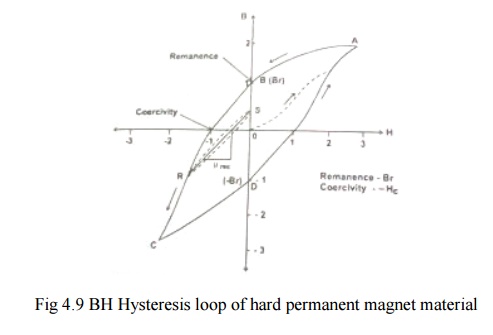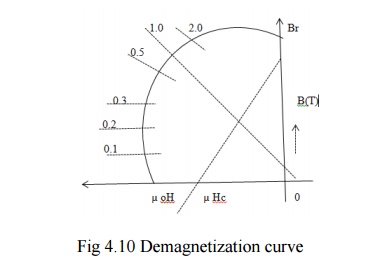Chapter: Special Electrical Machines : Permanent Magnet Brushless D.C. Motors
B – H Loop and Demagnetization Characteristics of BLPM Motors
B – H LOOP AND DEMAGNETIZATION
CHARACTERISTICS
1. Permanent Magnets Material
NdFeB –
Neodymium – iron – boron has the highest energy product of all commercially
available magnets at room temperature. It has high remanence and coercivity in
the motor frame size for the same output compared with motors using ferrite
magnets. But it is costlier. But both of the above stated magnets are sensitive
to temperature and care should be taken for working temperature above 100Ëš.For
very high temperature applications, alnico or rare earth cobalt magnets must be
used.
2. B – H Loop
It is used for understanding characteristics hysteresis loop as shown.

X – axis – Magnetizing force or field intensity H.
Y – axis – Magnetic flux density B in
the material.
v An un-magnetized sample has B = 0 and H = 0
and therefore starts out at the origin.
Curve OA
v If it is
subjected to a magnetic field, magnetic fixture (an electromagnetic with shaped
pole pieces to focus flux into the magnet), then B and H in the magnet follow
the curve OA as the external ampere – turns are increased.
Curve AB
v If the
external ampere – turns are switched off, the magnet relaxes along AB. The
operating point (H, B) depends on the shape of the magnet and permanence of the
surrounding magnetic circuit.If the magnet is surrounded by a highly permeable
magnetic circuit, that is if it is keepered then its poles are effectively
shorted together so that H = 0 and then the flux density is the value at point
remanence Br.
Pemanence:
Maximum flux density that can be retained by the magnet at a specified
temperature after being magnetized to saturation.
Curve BC
v External
ampere turns applied in the opposite direction cause the magnets operating
point to follow the curve from B through the second quadrant to C.
Curve CD
v If the ampere – turns are switched off at c
the magnet relaxes along CD.
It is now
magnetized in the opposite direction and the maximum flux density it can retain
when keepered is – Br.
v To bring
B to zero from negative remanence point D, the field +Hc must be applied.
v The
entire loop is usually symmetrical and be measured using instruments such as hysteresis
graph.
3. Soft PM
v Soft PM
materials have Knee in the second quadrant such as Alnico.
v Alnico
magnets have very high remanence and excellent mechanical and thermal
properties. But they are limited in the demagnetizing field they can withstand.
v These
soft PM are hard when compared with lamination steels the hysteresis loop of
typical non oriented electrical steel is very narrow when compared with Alnico.
4. Demagnetization curve

In the
absence of externally applied ampere – turn, the magnets operating point is at
the intersection of the demagnetization curve and the load line.
v The slope
of the load line is the product of µ0 and the permeance co efficient
of the external circuit.
In a
permanent magnet, the relationship between B and H is
B = µ0
H + J
µ0
H – flux density that would exist if the magnet were removed and the
magnetizing force remain at the value H.
J –
contribution of the magnet to the flux - density within its own volume.
v If the
demagnetization curve is a straight line, and therefore its relative slope and
there by the µrec is unity, Then J is constant.
J –
Magnetization of the magnet, unit T tesla
v Hard
magnets have µrec>= 1,J decreases as the –Hc increases.
v The
magnet can recover or recoil back to its original flux density as long as the
magnetization is constant.
v The
coercive force required to permanently demagnetize the magnet is called the
intrinsic coercivity and it is Hci.
Related Topics